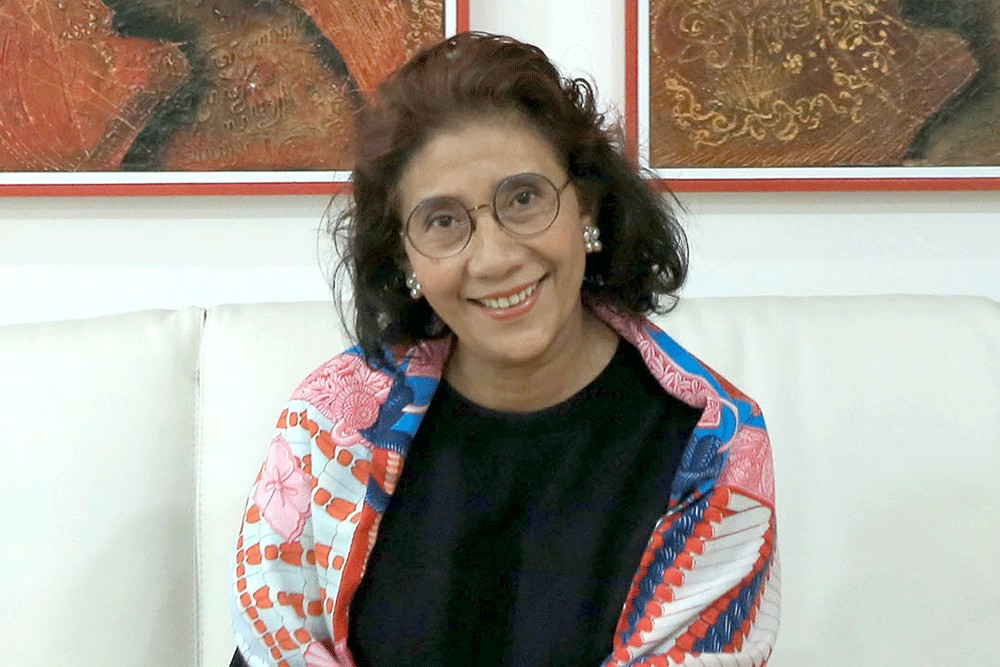Popular Reads
Top Results
Can't find what you're looking for?
View all search resultsPopular Reads
Top Results
Can't find what you're looking for?
View all search resultsDiscourse: Susi: Protecting ocean helps Indonesia shift to blue economy
Maritime Affairs and Fisheries Minister Susi Pudjiastuti shared with The Jakarta Post’s Gemma Holliani Cahya, Ina Parlina, M. Taufiqurrahman and Kornelius Purba the Indonesian government’s agenda for the conference, which runs until Tuesday.
Change text size
Gift Premium Articles
to Anyone
I
ndonesia is hosting the fifth Our Ocean Conference in Bali amid its fight against illegal, unreported and unregulated fishing and efforts to uphold the principles of sustainable fishing. Maritime Affairs and Fisheries Minister Susi Pudjiastuti shared with The Jakarta Post’s Gemma Holliani Cahya, Ina Parlina, M. Taufiqurrahman and Kornelius Purba the Indonesian government’s agenda for the conference, which runs until Tuesday.
Question: What do you think of and expect from the Our Ocean Conference?
Answer: First, it is an honor for Indonesia to have been entrusted to host the fifth Our Ocean Conference.
Second, we are proud of our performance in developing our ocean, and this is a chance for us to show our achievements in the development of a blue economy, which relies on two main pillars: sovereignty and sustainability. Based on these two pillars, we have achieved significant success in combating illegal, unreported and unregulated fishing. This is in line with a world trend in which we realize that it is not a state to state problem. There is only One World One Ocean.
Depleted stocks, ecosystem destruction and sustainability of the seas will affect the overall health and productivity of our seas. Why? Because in the fishing industry, there are many migratory fish. For example, 68 percent of the world’s stock of yellow fin tuna spawns in the Banda Sea in Maluku, then they travel around the globe before returning to the Banda Sea to spawn again.
We do not intend to show off our progress, but we need to share our experience. When one country cares and other countries follow suit, at the end the whole ocean will be more productive.
As part of the world community, Indonesia has actively participated to sticking to this commitment. To deal with ocean pollution, for instance, Indonesia has pledged to preserve about 20 million hectares of ocean for conservation by 2020. We have already met the target. There are now 161 sites throughout Indonesia dedicated to sea conservation.
We are also campaigning for the reduction of plastic waste in our ocean. The government is committed to cut it by 40 percent in 2025 and 70 percent in 2030. We are second in the world in terms of contributing to plastic waste in the ocean. The target is very ambitious, but when all related ministries, state agencies, civil society and people work together we can realize that commitment.
Since the fourth conference in Malta last year, what progress has Indonesia made?
This year, we have increased our sea conservation areas by 2 million ha. The most prominent development is in eastern Indonesia. The biggest area is the Sawu Sea, which covers 3.5 million ha. We are preserving it with the help of community leaders and local people. The government took the initiative and led efforts to provide resources to preserve the protected marine territory.
What do you think will happen to your legacy if you leave office?
The ministry is not supposed to depend on the minister. Anyone who holds the post should carry out the constitutional duties. What I do is not Susi who does it. Susi just executes it. The state cannot depend on an individual minister. The state should not only depend on the President either. I hope whoever replaces me will take such action.
What we have learned in the last four years is that if you are not doing it that way, it (illegal fishing) will recur. Once, we confiscated one boat three times, which does not make sense to me.
Having a deterrent effect is one of the best ways we can protect the sovereignty of our ocean. Why? Because with 97,000 kilometers of coast line and 5.8 million square kilometers of EEZ (Exclusive Economic Zone), it is impossible for us to patrol them all the time. So you have to earn respect, to make sure that people are scared of us and afraid of entering our waters illegally. We have to be very firm, strong and consistent. And a deterrent effect will only work if we are consistent.
When we are inconsistent, they will come again, because it’s a big business. These illegal, unreported and unregulated fishing activities are worth millions of dollars. I mean, we can see now what we have done so far. We have a fish stock assessment every two years and, in 2016, the figure had doubled from 6.5 million tons to 12.5 million tons.
At the same time, we have managed to increase our fish consumption from 36 kilograms per person per year to 46 kg. We have produced 2.5 million tons of fish without increasing imports.
How much fish do we export now?
Over the last four years, exports have steadily grown between 4 and 11 percent. And the fish price domestically contributed to our deflation, meaning it helped people to buy and consume more fish in number and quality. It is good to improve the quality of our human resources. We expect to have healthier and smarter people. More fish consumption will help us curb the problem of stunted children.
Now, our gross domestic product from our fishery sector is number one in Southeast Asia. Our fish imports have decreased by almost 70 percent since 2014, while exports have increased. Why? Because now we catch better quality fish. That’s why we are moving to what it is called a blue economy, which is basically sustainable productivity through appropriate exploitation management.











